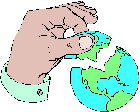The Schedule





A) Pre-class-time prep reading: The Complexities & Contradictions
of Globalization, by James N Rosenau, Current History, Nov. 1997. .For
basic concepts regarding localization/globalization tensions. "In short,
globalization is boundary-broadening and localization is boundary-heightening."
B) Post Game De-brief:
a. From the beginning of the game to the end, did the identity
and values of your group change? How? Why?
b. What type of nation (characteristics) did your team represent?
c. How well did this game serve to explain or represent globalization?
What mechanisms did it best represent?
C) Project: Global Community Readings
a. Economy:
i) Articles 16, The Invention of Development, by Arturo Escobar, Current
History, Nov. 1999; 17, The Crisis of Globalization, by James K. Galbraith,
Dissent, Su. 1999; & 18, Beyond the Transition: China's Economy at
Century's End, by Edward S. Steinfeld, Current History, Sep. 1999
ii) Ecology of Commerce, by Paul Hawken, © 1993 P. 17
b. Values:
i) Articles 2, The Many Faces of the Future, by Samuel P. Huntington,
Utne Reader, May/June 1997; 36, Universal Human Values: Finding an Ethical
Common Ground, by Rushworth M. Kidder, The Futurist, Jul/Aug 1994; &
40, Is Life Really Getting Better?, by Richard Eckersley, The Futurist,
Jan 1999
c. Place:
i) Articles 10, The Global Challenge, by Michael H. Glantz, The World
& I, Apr 1997; & 32, The Globalization of Tourism, The UNESCO
Courier, Jul/Aug 1999
ii) The Earth Charter, A Declaration of Interdependence: Values &
Principles for a Sustainable Future, www.earthcharter.org
d. The Other:
i) Articles 3, Life is Unfair: Inequality in the World, by Nancy Birdsall,
Foreign Policy, Su. 1998; & 7, The Misery Behind the Statistics: Women
Suffer Most, by Diana Brown, Free Inquiry, Sp. 1999
ii) Environment and Society: The Enduring Conflict, Chapter 8, by Allen
Schnaiberg & Kenneth Alan Gould, The Blackburn Press © 2000.
D) Questions
a. Can your portion (Economy, Values, Place, or The Other) of the
definition of community extend to the global level?
i) Who: Who are the individuals/groups that do or do not participate at
a global level?
ii) What: What are the activities/actions/motivations of your topic?
iii) Where: Are there metaphorical or literal physical locations for your
topic?
iv) When: Is a global community occurring now or will it occur in the
future?
v) Why: Why do people/groups do what they are doing?
Day 2: Map/Web Presentations:
How do the aspects of community, as discussed in the preceding
presentations, interact to create (or not) a "global community"?
What other resources did you find/use, (if any), in answering the assignment?